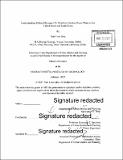Understanding political pressures To shutdown nuclear power plants in the United States and South Korea
Author(s)
Shin, Nah Yoon
DownloadFull printable version (9.760Mb)
Other Contributors
Massachusetts Institute of Technology. Department of Urban Studies and Planning.
Advisor
Lawrence E. Susskind.
Terms of use
Metadata
Show full item recordAbstract
Since the mid-1990s, thirty to forty-year-old nuclear power plants have been reaching their designed lifetimes. Many operating licenses, however, are being extended after regulators review safety considerations and environmental impacts associated with each extension. These regulatory reviews have become quite controversial, not just in the United States. I analyze a number of these in the United States and South Korea countries that are quite different in terms of their regulatory frameworks, electricity markets, safety requirements, and ways in which they engage the public in relicensing decisions. My findings are: 1) regulators, utility managers, nuclear professionals, and policy-makers in any country with aging nuclear plants are likely to face opposition from groups that do not trust the typical risk and safety assessment studies used to justify license renewals; 2) nuclear license renewal decisions are particularly prone to conflict if stakeholders are not involved early enough, and if they perceive that their concerns are repeatedly overlooked (on the grounds that only the results of professional risk modeling are valid); and 3) the credibility of license renewal decisions will hinge on site-specific information and local knowledge, not just generic national studies. Only if there is an earnest effort to engage potentially affected stakeholders, with the assistance of a neutral facilitator, can nuclear plant relicensing facilities be avoided. Stakeholders want an opportunity to focus on issues that are most important to them, particularly site safety, given the uncertainties involved in assessing the risks with continued operation of plants that had a limited design life.
Description
Thesis: S.M., Massachusetts Institute of Technology, Department of Urban Studies and Planning, 2017. Cataloged from PDF version of thesis. Includes bibliographical references (pages 134-147).
Date issued
2017Department
Massachusetts Institute of Technology. Department of Urban Studies and PlanningPublisher
Massachusetts Institute of Technology
Keywords
Urban Studies and Planning.